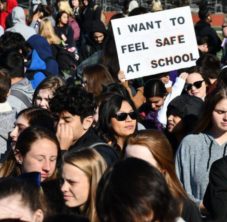I had a co-worker who over time became a good friend. During our many lunches together, he often expressed a strong pro-life stance: abortion is wrong, he could never do such a thing.
At one point this great-looking, successful guy met an equally great-looking, successful girl. They got married, got pregnant, found their first starter home, and their future was really, really good.
Then something went wrong with the pregnancy.
He never told me what happened, and I never asked. He did mention several times, though, that he now understood the pro-choice position.
I find this to be an expression of empathy. A resident holds a moral, political, or ethical position, but palpably understands what motivates the opposite position. This type of empathy goes a long way toward toning down the invective on issues national and local.
Another manifestation of empathy is sensitivity. A relative of mine has a child with special needs. My children are vibrant and normal 99% of the time, and only 1% of the time am I required to highlight that they fell off the evolution train at the Australopithecus sediba stage. While visiting with that relative I don’t expound my children’s accomplishments at school, their aspirations, and their limitless potential. Having something and parading it in front of someone who can’t have it is insensitive and malicious.
I bring all this up because the public-school teachers in the lead image above are not expressing empathy: they are binned somewhere in dismissive, spiteful, or arrogant.
The one on the left (or a teacher, principal, administrator like her) probably has a student with parents who immigrated from China. During an emotional conversation with me, one such parent said she was fearful of the school board and some of her child’s teachers. “We escaped China to get away from people who behave just like they do!” she bemoaned. There is an entire demographic of immigrant parents and students who expected that the authorities in the United States behave differently than those in the societies they escaped, and unfortunately for them they landed in Montgomery County Public Schools. The above teacher sincerely thinks she is working for a better society, but for some of her students she evokes a very threatening posture. If she can’t make all of her students and parents feel welcome and included, and if she dismisses their feelings, then a) she needs to get a job at a like-minded private school, or b) her students must be allowed a way out.
Similarly, some in MCPS think that the teacher on the right is expressing support for a liberation movement, while others fear that he is extolling a group of thugs that six months ago engaged in rape, castration, and murder. As with the previous teacher, if he can’t acknowledge the other side’s fears and modify his behavior, then a) he needs to work at a school aligned with his views, or b) his victims must be allowed a way out.
This is where MCPS’s implementation of DEI falls short. It’s excellent on diversity, still struggling but working on equality, but the inclusion is “you must be included in my way, and I’m exempt from your way.” Because there is no empathy, and because of the eight other reasons I’ve expressed in this series, it’s time for school vouchers.




